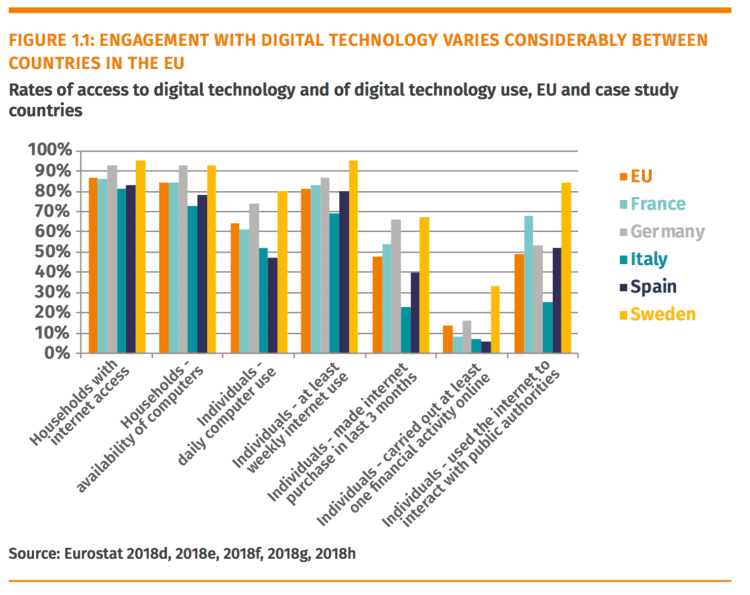Digitisation is transforming the nature of work, as well as many aspects of social and civic life. Digital skills are vital for individuals and national economies to prosper in a rapidly-changing world, bene ting from the opportunities of digital and remaining resilient to potential risks. More than 90 per cent of jobs in some categories now demand digital skills. Yet in 2016, just 56 per cent of Europeans had adequate digital skills for the world they live in, and 37 per cent of the workforce lacked adequate digital skills (European Commission gures).
Across the EU, levels of digital engagement vary considerably. ‘Frontrunner’ countries have high digital employment as well as commercial and social embedding. Some major economies which rely strongly on traditional industries have moderate levels of engagement, and a growing digital skills base. Countries which have faced economic challenges and high unemployment may be further behind, and there are also contrasts within countries; for example, rural areas, small businesses or marginalised communities may face greater barriers in adopting new technologies. Access to good digital skills development is essential to avoid a ‘digital divide’ between and within nations.
Governments, organisations such as the EU and the UN, and the private sector have responded to this challenge by developing policies and initiatives to build strong digital skills ‘ecosystems’ (for example, the EU’s Digital Skills and Jobs Coalition). These are characterised by extensive partnership working, drawing together national and regional government, public sector bodies, civil society and business.
‘Grow with Google’ is one such project. It operates through national programmes matched closely to the contexts and needs of individual countries, developed and delivered in collaboration with a range of partners. Training is free, and is offered in a range of online, of ine and blended formats to maximise reach and engagement. In particular, the programme helps SMBs to make the most of digital, and enables established workers to upskill for the changing world of work. It has reached over 3 million people through 32 programmes in 27 languages, and around 40 per cent of learners are women.
Programme evaluation shows substantial positive impacts for participants. Between 2015 and 2017, over 188,000 learners found a job or started their own business, and 32,000 businesses have taken on more staff. 505,000 businesses reported revenue and/or customer growth which they associate with their participation. Learner satisfaction is generally high, and most report outcomes such as behavioural change and enhanced con dence.
In this project we examined the development and approach of Grow with Google in six case study countries (Sweden, Germany, France, Spain, Italy and Nigeria) in order to identify key themes and learning to support ongoing good practice in growing a digital skills ecosystem. Our main recommendations are as follows.
1. A societal objective for improving digital skills works best when it’s coupled with specific aims for a community, sector or place. A general aim of increasing digital skill levels across an economy is most likely to be achieved when it is embedded alongside aims that are highly tangible for local policymakers and potential training participants – and for particular sectors, communities, life moments, and/or places (in France, for example, Google works closely with regional government to match training to local policy priorities; in highly-digitised Sweden, some training focusses in particular on SMBs and rural areas that have low digital engagement).
2. As well as programme aims, programme delivery, format and content are more effective when tailored to local contexts and needs. Rather than ‘one size ts all’ formats, programmes need to be designed for national contexts, and often work best when there is scope for further local ‘tailoring’, in content, format, and/or delivery approach (for example, in the development of a specialised option for unemployed people based on one of the MOOCs in the Spanish programme).
3. Public/private partnerships, and partnerships between companies, government and civil society are powerful; these should be sought, facilitated, and nurtured over time. In all of our case study countries, public/private partnerships are working well to add value to programmes. Their strengths include:
– a high degree of programme relevance to policy across related areas, such as economic development and education
– the ‘reach’ of government and access to learners, including those who might be hard to reach, such as low-skilled unemployed people
– opportunities to work with innovators within government
– access to the expertise that resides in public and civil society organisations
– the trust that comes from working with highly recognisable and accountable bodies.
4. Policymakers and designers of training programmes need to ‘think differently’ about digital, and its social and commercial place, to maximise access to training and increase diversity. Successful programmes often challenge established assumptions about which people are ‘natural’ candidates for digital skills development, or about where digital belongs socially and sectorally (for example, engagement with unemployed people in Italy, Spain and Nigeria, and programmes that seek to break down gender stereotypes).
5. Platform agnosticism is important in providing valid training and gaining buy-in. This helped Grow with Google programmes gain trust, but it goes well beyond branding. Offering training in products and packages from right across the market means that learning is as current and relevant to participant needs as possible, and builds a base of generic skills that form a strong foundation for further learning.
6. Changing a learning culture is more powerful than just offering physical products. Initiatives based primarily on donations of hardware can be less sustainable than those which cast digital as being about learning, interaction and creativity located in individuals and communities.
7. Skills forecasting is as important as providing ‘just in time’ skills for immediate use; facilitating reskilling and lifelong learning is as important as providing good training to meet current needs. Governments and businesses need skills to help businesses improve their near-term outcomes, and workers to thrive in the current economy. But in a world undergoing rapid digital transformation, skills for tomorrow and a culture of ‘upskilling’ and lifelong learning are arguably just as important.
8. Digital literacy, awareness and empowerment – including learning for a ‘big data world’ and for privacy and security online – are important for individuals and societies. The potential downsides of digital are highly publicised, including online abuse, misleading information, and data abuse. A belief (tacit or explicit) that these are inherent in digital, rather than problems that can be managed by informed tech users could lead to disengagement and potentially leave the eld open to abusers. Good education and learning opportunities can help empower users to be safe, secure, responsible and critically aware online, and to make well-informed decisions about data.
9. Networks are powerful drivers of learning, and training should seek to support – and to learn from – formal and informal learning networks. Effectively managed – both operationally, and in terms of more complex issues such as power relationships and ownership – they can bring about change and become more than the sum of their parts, as demonstrated by several examples in this study.
10. Impact studies conducted at a small geographical, demographic or sectoral scale may yield valuable insights into effective practice. Measuring the impact of training programmes on national economies presents challenges of identifying a link between training and impact, or teasing out which elements of practice have had most impact. However, there may be valuable opportunities to explore effects at the local or sectoral level.
Chosen excerpts by Job Market Monitor. Read the whole story at Building the workforce of the future: Learning from Grow with Google | IPPR





Discussion
Trackbacks/Pingbacks
Pingback: Which Digital Skills Count – Measuring only overall demand can be misleading | Job Market Monitor - November 26, 2018
Pingback: The Future of Work – Five policies to help the middle class from displacement | Job Market Monitor - December 15, 2018
Pingback: Future of Work – Fostering the benefits of new technologies requires good measures of their impact | Job Market Monitor - January 23, 2019
Pingback: The Future of Work in US – Five policy strategies for adjusting to automation | Job Market Monitor - March 4, 2019
Pingback: Essential Digital Skills Framework for UK- What adults need to safely benefit from, participate in and contribute to the digital world | Job Market Monitor - March 15, 2019
Pingback: The Future of Work and Skills Acquisition – A shift in mindset is needed | Job Market Monitor - August 21, 2019
Pingback: The Geography of the Future of Work in US – A mosaic of local economies on diverging trajectories | Job Market Monitor - August 31, 2019
Pingback: Reskilling – CEOs are now focussed on reskilling and upskilling their existing workforce says PWC’s 22nd CEO Survey | Job Market Monitor - November 22, 2019
Pingback: Digital Skills in Australia – Amongst the fastest growing | Job Market Monitor - March 18, 2022